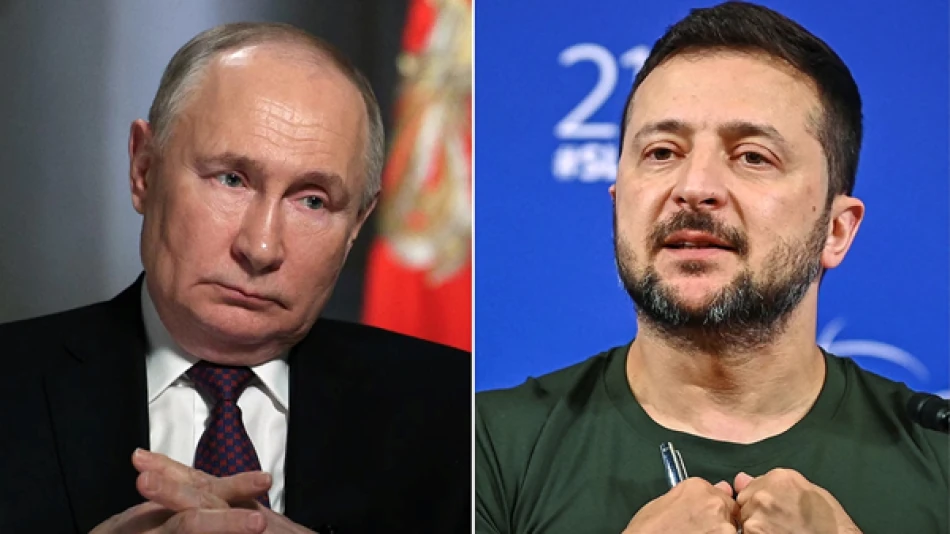
Trump Continues Efforts to Facilitate Putin-Zelensky Summit
Trump Pushes for Putin-Zelensky Summit as Russia Sets Preconditions for Peace Talks
President Donald Trump is actively working to arrange a direct meeting between Russian President Vladimir Putin and Ukrainian President Volodymyr Zelensky, with the White House confirming ongoing diplomatic efforts despite Russia's insistence on predetermined conditions for any high-level summit. The push comes as Trump suggested such a meeting could occur within two weeks during recent White House discussions with European leaders.
White House Maintains Diplomatic Pressure
A White House official, speaking on condition of anonymity, confirmed that "President Trump and his national security team continue to communicate with Russian and Ukrainian officials to arrange a bilateral meeting to stop the killing and end the war." This represents a continuation of Trump's campaign promise to quickly resolve the Ukraine conflict, though the timeline appears more ambitious than many diplomatic experts anticipated.
The urgency reflects Trump's broader foreign policy approach of direct leader-to-leader diplomacy, reminiscent of his previous summits with North Korea's Kim Jong Un and his past meetings with Putin during his first presidency.
Moscow's Strategic Positioning
Kremlin Sets Terms for Engagement
Dmitry Peskov, the Kremlin spokesman, signaled Friday that Russia remains open to a Putin-Zelensky meeting but emphasized Moscow's preference for structured negotiations. "Putin believes that any high-level meeting should be well-prepared and should confirm results achieved at the expert level," Peskov told Russian news agencies.
This stance suggests Russia wants to enter any summit from a position of strength, with preliminary agreements already secured before leaders sit down. Such an approach could give Moscow significant leverage in shaping the agenda and potential outcomes.
European Skepticism Emerges
Peskov's comments came in response to German Chancellor Friedrich Merz, who expressed doubt Thursday about the prospects for immediate Putin-Zelensky talks. This skepticism from Germany, Ukraine's second-largest military supporter after the United States, highlights the complex diplomatic landscape Trump faces in orchestrating such a meeting.
The German position reflects broader European concerns about rushing into negotiations that could potentially legitimize Russian territorial gains or undermine Ukraine's negotiating position.
Strategic Implications for All Parties
Trump's High-Stakes Gambit
The two-week timeline Trump floated during Monday's White House meeting with Zelensky, Merz, and other European leaders represents a significant diplomatic gamble. Success would validate Trump's unconventional approach to international relations and potentially deliver on a major campaign promise early in his presidency.
However, failure to arrange such a meeting—or a summit that produces no meaningful progress—could expose the limitations of personal diplomacy in resolving complex geopolitical conflicts that have resisted resolution for nearly three years.
Ukraine's Delicate Balance
For Zelensky, any direct talks with Putin carry both opportunity and risk. While Ukraine desperately needs an end to the devastating conflict, entering negotiations without strong security guarantees or territorial assurances could undermine the sacrifices made by Ukrainian forces and civilians.
The Ukrainian president must also balance his relationship with Trump—crucial for continued U.S. military aid—against domestic pressure to avoid any appearance of capitulation to Russian demands.
Historical Context and Precedent
Previous attempts at high-level Russia-Ukraine negotiations, including the March 2022 talks in Turkey and various diplomatic initiatives throughout the conflict, have consistently foundered on fundamental disagreements over territorial sovereignty and security arrangements. Putin's insistence on "expert-level" preparation suggests Russia learned from these earlier failures and wants concrete preliminary agreements before risking presidential-level engagement.
The current diplomatic push also occurs against the backdrop of ongoing military operations, with both sides potentially viewing negotiations as either a path to favorable terms or a tactical pause to regroup and resupply.
Most Viewed News

 Layla Al Mansoori
Layla Al Mansoori






